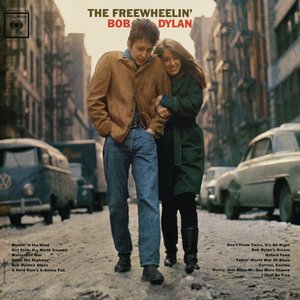Published on Oct 2, 1999
In 1962, Bob Dylan burst forth onto the music scene with an
album comprised mostly of covers and two originals. Nowadays, we’d
probably expect that his first album was met with commercial
acclaim; instead, it sold poorly. It was an excellent effort, but
it showed the artist still searching for his own voice.
One album later, on 1963’s
The Freewheelin’ Bob Dylan, that voice was found. With only
one song that Dylan didn’t at least co-write and a more socially
conscious stand to his songs, Dylan finally was being recognized as
the next leader of the protest movement. It still isn’t perfect –
but it’s damn near.
The Freewheelin’ Bob Dylan is highlighted by two firsts for
Dylan in his young career. From what I could hear, this is the
first time that he chose to use 12-string guitar on some songs,
such as “Blowin’ In The Wind”. It also is the first time that Dylan
uses more accompaniment than just his guitar and harmonica. But
make no mistake, Dylan is still the star of the show – and
rightfully so.
Looking at some of these songs in 1999, tracks like “A Hard
Rain’s A-Gonna Fall” and “Blowin’ In The Wind” don’t sound like
angry statements about society in 1963. Then again, I never saw the
anger in “This Land Is Your Land,” so maybe I’m not the best judge
of the protest movement.
It took me a long time to get used to the original version of
“Blowin’ In The Wind,” having grown up with the Peter, Paul &
Mary version. But the effort proves to be worth it, as Dylan’s
first take has a certain magic about it, even if the time signature
isn’t always followed to the letter of the law. (Maybe this was the
big difficulty I first had with this album; getting through
Bob Dylan actually helped me see this album in a better
light.)
What is evident on
The Freewheelin’ Bob Dylan is that Dylan is more comfortable
with his role as a folk singer and as a songwriter; tracks like
“Girl From The North Country,” “Don’t Think Twice, It’s All Right”
and “I Shall Be Free” all show images of an artist who has grown in
such a short time. If you need further proof, listen to the
scathing commentaries on tracks like “Masters Of War” and “Talking
World War III Blues”, the latter being one of my favorites off this
album.
If you’re not familiar with Dylan’s style,
The Freewheelin’ Bob Dylan is occasionally a difficult
listen. But if you take the time to get to know both the songwriter
and his own unique musical style, the end result will be quite
pleasant. There’s a reason why many people consider this album to
be a high-water mark of Dylan’s early career; listen to it again,
and discover why.
